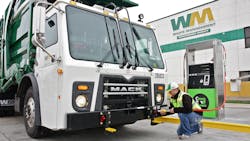The on-road transportation industry is at a critical inflection point. While diesel and gasoline have dominated for decades, the industry is seeing a shift where clean and advanced vehicle technologies are competing on the metrics most essential to fleet managers—performance, range, and an overall total cost of ownership. Until now, there was no single industry resource that assessed numerous trends, technologies, and fleet insights across sectors, leaving fleets to navigate the complex and ever-changing world of clean and advanced vehicle technologies largely on their own.
Data gathered directly from fleet owners and operators across the U.S. makes the “State of Sustainable Fleets,” a new report launching this month, the first comprehensive industry resource to examine the current use and anticipated adoption trends of clean and advanced vehicles across sectors.
The report includes the most prevalent sustainable vehicle platforms for medium- and heavy-duty fleets—including natural gas, propane, battery electric (BEVs), and hydrogen fuel cell electric vehicles (FCEVs)—and compares them to a baseline of diesel and gasoline vehicles. The report analyzes these vehicle platforms across public, private, and for-hire fleets, including school, municipal/shuttle, urban delivery, refuse, utility, transit, short-haul, and long-haul sectors.
One key takeaway from the report is that all sustainable vehicle platforms the report studied are seeing a growth in fleet use across medium- and heavy-duty sectors. Furthermore, 98% of fleets surveyed expect to continue the same level or increase their use of sustainable vehicle technologies and fuels. While transit agencies are leading adopters of natural gas, BEVs, and even FCEVs, almost every medium- and heavy-duty fleet type the report assessed is using at least one of these clean technologies in growing numbers.
This was most apparent with near-zero emission technologies and renewable fuels. More specifically, near-zero emission natural gas engines paired with renewable natural gas (RNG) has increased by more than 400% in recent years. This is due to RNG’s price-competitiveness in states like California and Oregon, unbeatable emission benefits, and seamless drop-in nature.
Offering the first standardized fleet insights that highlight the benefits and challenges across drop-in renewable fuels—including renewable diesel, biodiesel, RNG, renewable electricity, renewable hydrogen, and renewable propane—the report finds fleets that have successfully deployed the underlying vehicle platforms prefer most renewable fuels and experience no performance loss compared to conventional fuels. Fleets reported that the key barrier for more widespread adoption of renewable fuels is the often higher cost and challenges with procurement.
On the zero-emission vehicle front, the report found that more than half of fleets surveyed that are early adopters of clean vehicle technologies have implemented BEVs in their operation. That number is expected to grow, with 69% of fleets surveyed having plans to use BEVs in their future operations. Additionally, the number of new medium- and heavy-duty BEV deployments is estimated to double in the next two years. Short- and long-haul fleets are expected to see fewer BEV deployments in the near term; however, these sectors have a reported interest in FCEVs, and there are a growing number of related pilots to demonstrate the feasibility of the technology for these fleet types.
________________________
Erik Neandross is CEO of Gladstein, Neandross & Associates (GNA), the clean transportation and energy consulting firm that organizes the Alternative Clean Transportation (ACT) Expo. Learn more at www.gladstein.org and www.actexpo.com.
About the Author

Erik Neandross
Contributing editor
Erik Neandross is CEO of Gladstein, Neandross & Associates, the clean transportation and energy consulting firm that organizes the Alternative Clean Transportation Expo. He also serves on the Coalition for Clean Air board of directors.

